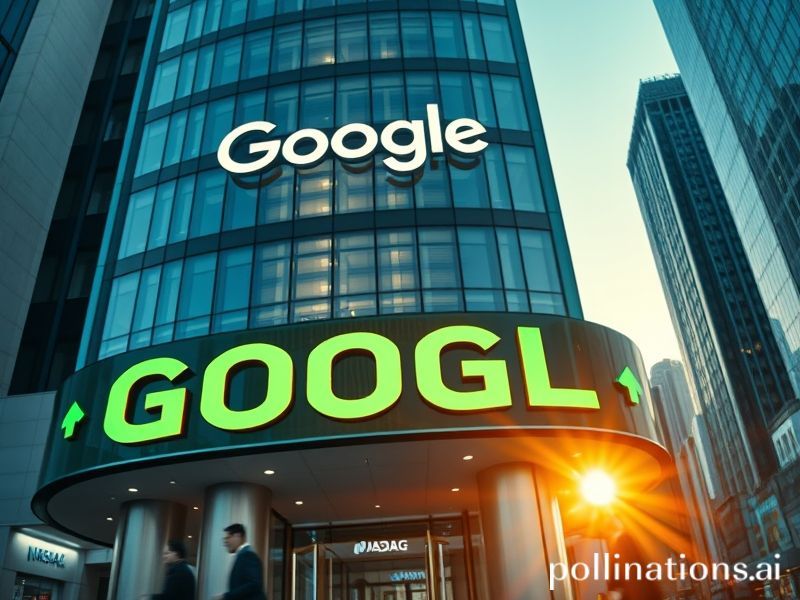GOOGL Stock Globetrots: How One Ticker Became the World’s Favorite Guilty Pleasure
Alphabet’s share price—ticker GOOGL—has been waltzing across trading screens like a tipsy diplomat at a UN reception: one moment bowing to regulators, the next pirouetting on AI headlines, never quite spilling the drink. To most retail investors from Jakarta to Johannesburg, the stock is simply “the Google thing,” a proxy bet on humanity’s incurable need to ask the internet why it hurts when they do *that*. But beneath the glossy earnings call lies a darker comic opera with a truly global cast.
Start with the obvious: roughly 90 percent of the planet’s internet searches still flow through Google, a monopoly so elegant that entire governments have given up trying to break it and settled for theatrical fines instead. The European Commission, that indefatigable hall monitor of Big Tech, has slapped Alphabet with roughly €8 billion in antitrust charges over the past decade—an amount the company earns back in about 22 days of ad revenue. Each fine is ceremoniously announced in Brussels, applauded by NGOs, then quietly buried under a mountain of billable hours. Investors, naturally, cheer: fines are just the cost of moat maintenance, like repainting the castle walls.
Meanwhile, in India, Google Play billing rules have been declared illegal so many times that the company now employs a dedicated courtroom translator whose only job is to recycle the same 400-page compliance filing in seven languages. The Indian Supreme Court’s latest ruling shaved a whole 0.3 % off GOOGL after hours—roughly the market cap of Sri Lanka—before bargain hunters in Singapore swooped in. Emerging-market fund managers call this “regulatory arbitrage yoga”: bend until the risk premium disappears.
China, of course, remains the great unmentionable. Google left the mainland in 2010, loudly citing human-rights concerns, yet quietly keeps a beachhead in Shenzhen for hardware partnerships and an AI research lab in Beijing that specializes in *exactly* the sort of large-language models now powering Bard. This geopolitical schizophrenia is priced into GOOGL via the “China discount,” a polite fiction that lets analysts pretend the stock would be 15 % higher if only Xi Jinping were more like Canada. Canadian pension funds, meanwhile, hold $12 billion worth of Alphabet precisely because it isn’t exposed to Beijing—proving that irony remains the most liquid asset class of all.
Over in Africa, where mobile data costs more per gigabyte than a bottle of clean water, Google’s free “offline search” app is the de facto portal to the web. Local telcos grumble that Alphabet captures the ad upside while they eat the bandwidth bill. Investors file this under “strategic goodwill,” a euphemism for colonialism 2.0 with better fonts. The Nairobi Securities Exchange even launched a fractional-share product pegged to GOOGL so that Kenyans can bet on Silicon Valley’s mood swings without converting shillings to dollars—financial inclusion at its most dystopian.
Then there’s the AI subplot, a farce in three regulatory acts. Washington frets that Bard might teach teenagers how to build pipe bombs; Brussels drafts another 200-page risk taxonomy; Tokyo politely asks for a 48-hour delay before the chatbot tells citizens which subway lines are on fire. Each bureaucratic tremor sends options traders scrambling, yet the stock barely flinches. Why? Because the real customers—Fortune 500 marketing departments from São Paulo to Stockholm—have already decided that whatever hallucinations Bard produces are still cheaper than hiring actual copywriters. Human obsolescence, it turns out, has excellent margins.
Currency swings add a final layer of absurdity. When the yen collapsed last year, Japanese retail investors—ever the connoisseurs of volatility—piled into GOOGL as a “dollar-denominated lifeboat.” The same happened in Turkey when the lira staged its periodic swan dive. In both cases, the bet was not on Alphabet’s innovation pipeline but on the sheer gravitational mass of American big tech: the digital equivalent of buying canned goods before a hurricane.
So where does this leave the planet’s most analyzed ticker? Hovering near all-time highs, padded by buybacks, buoyed by the collective delusion that regulators will remain too fragmented to act in concert. The cynical read: GOOGL is less a company than a weather system—vast, inevitable, occasionally dented by regulatory hail, but ultimately impervious to individual governments or, indeed, individual humans. Buy it, and you’re not investing in technology; you’re investing in humanity’s laziness, venality, and undying preference for free stuff with ads. In other words, a sure thing—until the meteor of genuine antitrust splits the sky, at which point we’ll all search “what just happened?” on Bing.







